现代英语词汇学概论chapter1
英语词汇学Chapter 01
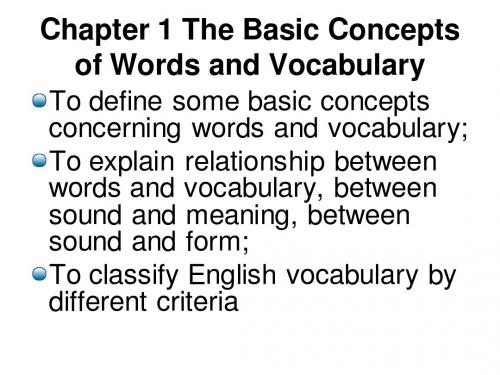
e. g. • can-opener • dip • persuader
(all-purpose key) (pick-pocket) (dagger)
e. g. • beauty (AusE: excellent, great) • auld (Scot: old) • hame (Scot: home) • lough (Irish: lake)
• This symbolic connection is almost always arbitrary, and there is ‘no logical relationship between the sound which stands for a thing or an idea and the actual thing and idea itself’ (Lodwig and Barrett, 1973)
1.5 Classification of Words • The English vocabulary, multifarious in nature, consists of words of all kinds. They can be classified by different criteria and for different purposes.
e. g. • In medicine: photoscanning, hepatitis, indigestion, penicillin • In education: audiovisual, megauniversity, microteaching
e. g. • In business: bottom line, balloark figures • In horse-racing: hold him back, hold him in • In medicine: paranoid, persona, hypo
现代英语词汇学概论最强版复习资料chapter1
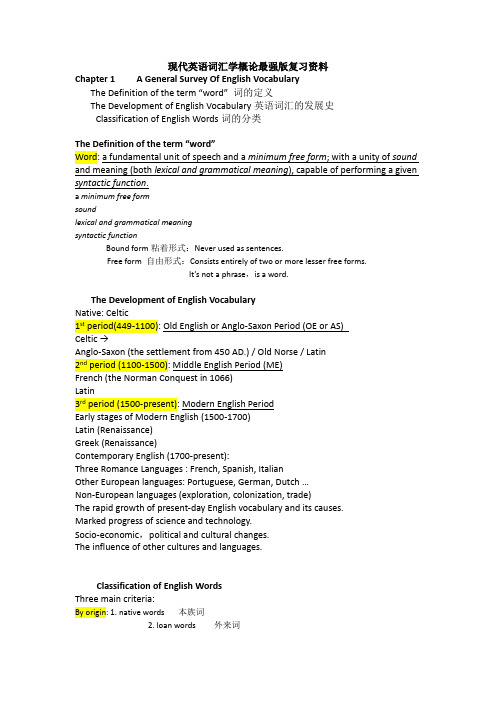
现代英语词汇学概论最强版复习资料Chapter 1 A General Survey Of English VocabularyThe Definition of the term “word” 词的定义The Development of English Vocabulary英语词汇的发展史Classification of English Words词的分类The Definition of the term “word”Word: a fundamental unit of speech and a minimum free form; with a unity of sound and meaning (both lexical and grammatical meaning), capable of performing a given syntactic function.a minimum free formsoundlexical and grammatical meaningsyntactic functionBound form粘着形式:Never used as sentences.Free form 自由形式:Consists entirely of two or more lesser free forms.It’s not a phrase,is a word.The Development of English VocabularyNative: Celtic1st period(449-1100): Old English or Anglo-Saxon Period (OE or AS)Celtic →Anglo-Saxon (the settlement from 450 AD.) / Old Norse / Latin2nd period (1100-1500): Middle English Period (ME)French (the Norman Conquest in 1066)Latin3rd period (1500-present): Modern English PeriodEarly stages of Modern English (1500-1700)Latin (Renaissance)Greek (Renaissance)Contemporary English (1700-present):Three Romance Languages : French, Spanish, ItalianOther European languages: Portuguese, German, Dutch …Non-European languages (exploration, colonization, trade)The rapid growth of present-day English vocabulary and its causes.Marked progress of science and technology.Socio-economic,political and cultural changes.The influence of other cultures and languages.Classification of English WordsThree main criteria:By origin: 1. native words 本族词2. loan words 外来词By level of usage: 1. common words 普通词2. literary words 书面词3. colloquial words 口头词4. slang words 俚语5. technical words 术语By notion: 1. function words 功能词2. content words 实义词By origin:1. native words 本族词2. loan words 外来词Native words: words of Anglo-Saxon origin or of old EnglishFeatures of native words:Most are monosyllabicforming the great majority of the basic word stockLoan / borrowed words: those borrowed from other languagesBasic word stock:auxiliary, modal verbs, numerals, pronouns, prepositions, conjunctions, the most frequently used words (essential to life)National characterStabilityWord-forming abilityAbility to form collocationsBy level of usage:1. Common words 普通词2. Literary words 书面词3. Colloquial words 口头词4. Slang words 俚语5. Technical words 术语*There are no clear-cut boundaries between the various classes of words.Common words普通词:connected with the ordinary things or activities necessary to everyday lifeThe core of the common words is the basic word stock.Stylistically neutralLiterary words书面词:chiefly used in writing, especially in books written in a more elevated style, in official documents, or in formal speeches.Most are of French, Latin or Greek origin.Among the literary word, two categories are noteworthy:archaic words . obsolete words)poetical wordsSlang俚语:Language, words or phrases of a vigorous, colorful, facetious, or taboo nature, invented for specific occasions, or uses or derived from the unconventional use of the standard vocabularyNot generally used in informal conversation unless the speakers are on intimate termsEmbracing those daring and new expression that have not been accepted as standard EnglishThe chief reason for use of slang: secure freshness and noveltyTechnical words术语:used in various fields: science, profession or trade, art, sportincreasing precision in nomenclatureone specific meaningLatin or Greek in originBy notion:1. function words 功能词2. content words 实义词Function words:determiners, conjunctions, prepositions, auxiliariesnot having much lexical meaningserving grammatically:Behaving like grammatical signals or functional markers,Expressing the kinds of connection between content wordsConstructing acceptable English sentencessmall in number and stable:In relatively closed listsBelonging to a relatively small and permanent set of words)high frequency。
Chapter One(A) 英语词汇学课程简介
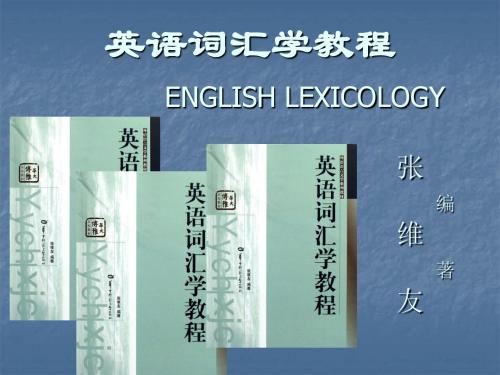
兼任 湖北省学位委员会评议组成员、华中师范大学学位 委员会第3、4届委员、教育部人文社科基地华中师大语言 与语言教育研究中心兼职研究员。学术兼职包括全国专业 英语研究会理事、中南地区外语教学法研究会副理事长、 湖北省翻译者协会副会长、武汉欧美同学会常务理事等。 被邀担任教育部全国本科教学评估专家和教育部出国留学 基金语言学评审专家。同时担任上海外语教育出版社教育 部"十五"规划项目英语专业教材编写委员会委员,重庆出 版社中西部英语专业系列教材编写委员会委员。 主讲 英语词汇学、文体学、语义学等理论课程。从事语 言学和应用语言学方面的研究,并对话语篇章、语用、语 言与文化等有浓厚的兴趣。
近年来,汪榕培教授在中国古典文学英译和中西 文化比较等方面取得了突破性的进展,先后完成 了 《英译老子》、《英译易经》、 《英译陶诗》、 《英译诗经》、《英译庄子》、 《英译邯郸记》 《英译汉魏六朝诗三百首》、 《英译牡丹亭》、 《英译孔雀东南飞· 木兰诗》、等译著, 并撰写了一系列相关的论文,出版了专著《比较 与翻译》和《陶渊明诗歌英译比较研究》,得到 国内外学者的高度重视。他目前正在继续进行典 籍英译研究工作,兼任苏州大学、大连理工大学 博士生导师。
What we shall learn in ish lexicology is more than to learn to remember new words,but it will make you powerful in learning new words. 有人误认为词汇学就是“学词汇”。
4.所有作业,独立完成,不能抄袭 ,否则扣分。
Chapter One
The Basic Concepts of Words and Vocabulary
英语词汇学chapter1
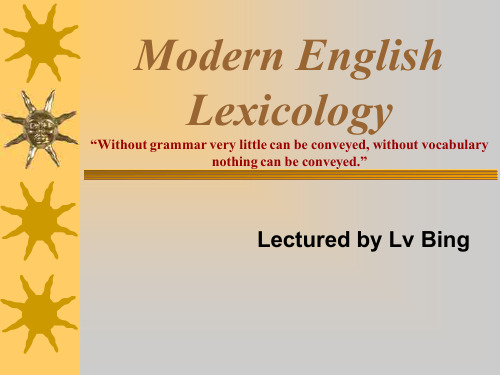
The Old English (449-1100)
�
�
The vocabulary of Old English was chiefly AngloSaxon with a small mixture of Old Norse words as a result of the Scandinavian or the Danish conquests of England in the ninth century, such as, cake, call, egg, knife, take, give, etc. The English continued to adopt words from Latin during the Old English period due to the Angles and Saxons’ various contacts with the Romans, such as, candle, kettle, mountain, school, cup, etc.
The Middle English (1100-1500)
The Middle English (1100-1500)
The Norman Conquest: William, the Conqueror, the Duke of Normandy, invaded and conquered England and the AngloSaxons in 1066 AD.
Influences
Celts (the earliest inhabitants) 450 790 1066 The conquest and settlement of the Angles, Saxons, and the Jutes the Scandinavian or the Danish conquests The Norman Conquest
现代英语词汇学概论第一章汉语版
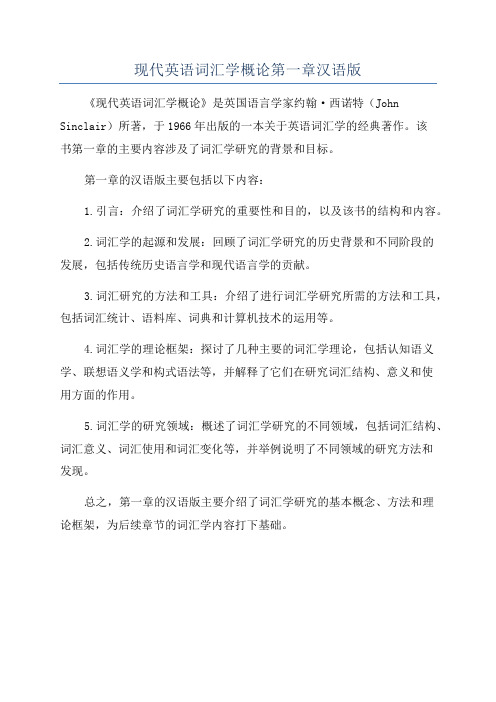
现代英语词汇学概论第一章汉语版
《现代英语词汇学概论》是英国语言学家约翰·西诺特(John Sinclair)所著,于1966年出版的一本关于英语词汇学的经典著作。
该
书第一章的主要内容涉及了词汇学研究的背景和目标。
第一章的汉语版主要包括以下内容:
1.引言:介绍了词汇学研究的重要性和目的,以及该书的结构和内容。
2.词汇学的起源和发展:回顾了词汇学研究的历史背景和不同阶段的
发展,包括传统历史语言学和现代语言学的贡献。
3.词汇研究的方法和工具:介绍了进行词汇学研究所需的方法和工具,包括词汇统计、语料库、词典和计算机技术的运用等。
4.词汇学的理论框架:探讨了几种主要的词汇学理论,包括认知语义学、联想语义学和构式语法等,并解释了它们在研究词汇结构、意义和使
用方面的作用。
5.词汇学的研究领域:概述了词汇学研究的不同领域,包括词汇结构、词汇意义、词汇使用和词汇变化等,并举例说明了不同领域的研究方法和
发现。
总之,第一章的汉语版主要介绍了词汇学研究的基本概念、方法和理
论框架,为后续章节的词汇学内容打下基础。
现代英语词汇学概论chapter1
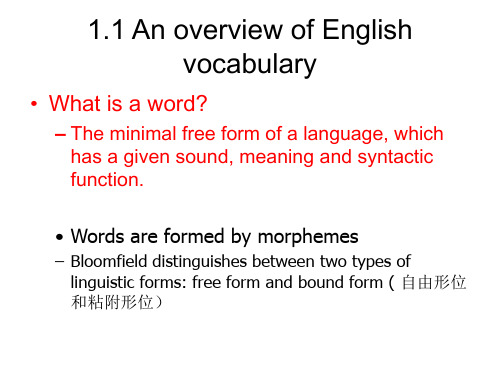
– By the end of the 13th century, English gradually came back into the schools, the law courts, and government and regained social status thanks to Wycliff translation of the Bible and the writings of Chaucer.
11
• In fact English has adopted words from almost every known language in the course of its historical development.
• As summed up in The Encyclopedia Americana: “…The English language has vast debts. In any dictionary some 80% of the entries are borrowed” English is supposed to have the most copious vocabulary of all the language in the world, estimated at more than a million words.
12
1.2.2 The growth of present-day English vocabulary
现代英语词汇学概论1解析
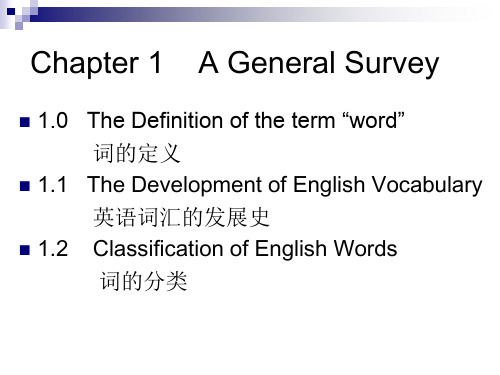
1.1 The Development of English Vocabulary
Questions: 1. How many stages does English vocabulary develop?
2. At each stage, there are how many origins English words come from?
back
1.2 Classification of English Words
Questions: 1. The main criteria by which we can classify English words?
2. According to different criteria, how can we classify English words?
2. How can we define the term “word”? Can you give an example to illustrate it?
Word: a fundamental unit of speech and a minimum free form; with a unity of sound and meaning (both lexical and grammatical meaning), capable of performing a given syntactic function.
Review
Word: a minimum free form sound lexical and grammatical meaning syntactic function
英语词汇学第一章[文字可编辑]
![英语词汇学第一章[文字可编辑]](https://img.taocdn.com/s3/m/9cff9d9b76eeaeaad1f3304f.png)
? Invention, expansion, omission, justification, modernization, description
? 这几个都是词素变体。
? 请在以下单词前加前缀,使其具有“不” 的意思:
? Perfect, balance, mobile ? Responsible ? Logical ? Flexible, excusable ? im-, ir-, il- 都是in-的词素变体
? How much vocabulary should a Chinese student have?
? most frequently used coverage of reading materials
? 1,000
80.5%
? 2,000
89%
? 3,000
93%
? 4,000
95%
? 5,000
? English lexicology
– The study of English vocabulary
? Exercises:
– To be done after class
1.2 The Structure of English Words
? Lead-in
? What is a word?
– Cf: German 185,000 – French 100,000
? How much vocabulary did literary masters have?
– Shakespear: 24,000 – Milton: 16,000 – …… – English educated people: 25,000 √ – Chinese educated people: 5000
- 1、下载文档前请自行甄别文档内容的完整性,平台不提供额外的编辑、内容补充、找答案等附加服务。
- 2、"仅部分预览"的文档,不可在线预览部分如存在完整性等问题,可反馈申请退款(可完整预览的文档不适用该条件!)。
- 3、如文档侵犯您的权益,请联系客服反馈,我们会尽快为您处理(人工客服工作时间:9:00-18:30)。
8
• The Old English (450-1100)
– The history of the English language begins with the conquest and settlement of what is now England by the Angles, Saxons, and the Jutes from about 450 AD. The language they spoke was Anglo-Saxon, which replaced the Celtic spoken by the former inhabitants Celts. – The vocabulary of the Old English consisted mainly of Anglo-Saxon words, 85% of which was no longer in use now. – Old English was rather different from Modern English in pronunciation, vocabulary and grammar.
13
• Neologisms (after World War II) • newly coined words or words that are given new meaning to fit new situation because of social, economic, political, cultural, scientific and technological changes in human society. • The main reasons (sources) for the frequent appearance of neologisms are three: – Marked progress of science and technology – Socio-economic, political and cultural changes – The influence of other cultures and languages
1.1 An overview of English vocabulary
• What is a word?
– The minimal free form of a language, which has a given sound, meaning and syntactic function. • Words are formed by morphemes
12
1.2.2 The growth of present-day English vocabulary
• The 19th and 20th centuries saw an unprecedented growth in scientific vocabulary as a consequence of the industrial revolution and the scientific exploration and discovery. • American English began to make their way to the British Isles about 1820.
6
1.2 Development of English vocabulary
• The World Languages
– It is estimated that there are about 5000 languages all over the world, which can be grouped into about 300 language families, such as Sino-Tibetan Family, IndoEuropean Family, Altaic Family, and so on. – Chinese is a member in the Sino-Tibetan Family, while English is a member in the Indo-European Family.
• The history of the English language is divided into three periods. – Old English (449-1100) – Middle English (1100-1500) – Modern English (1500-present)
2012-12-16
9
• The Middle English (1100-1500)
– Middle English is characterized by the strong influence of French following the Norman Conquest in 1066. – A great number of French words (about 9,000) were introduced into English. The Norman Conquest virtually introduced French-English bilingualism into England. (The Norman dialect of French became the language of the upper
4
Lexicology
the study of the lexis in human language
(Howard Jackson & Etienne Zė 2001, 陆国强 1999, et.al)
general lexicology & special lexicology
study the universal principles
11
• In fact English has adopted words from almost every known language in the course of its historical development.
• As summed up in The Encyclopedia Americana: “…The English language has vast debts. In any dictionary some 80% of the entries are borrowed” English is supposed to have the most copious vocabulary of all the language in the world, estimated at more than a million words.
• the criteria to divide language families ?
– 1. the basis of similarities in their basic word stock – 2. grammar
7
1.2.1 Historical development of English vocabulary
10
• Modern English (1500-Now)
– Modern English began with the establishment of printing in England by William Caxton. – Early Modern English (1500 – 1700, the period of the Renaissance, which began in Italy, spread in Europe and reached English in 16th century). In this period the influence of Latin and Greek on English was great. Scholars translated literature from Latin and Greek into English. – In this period, the study of classics were stressed and the result was the wholesale borrowing from Latin. The Latin loan words were mostly connected with science and abstract ideas.
study the lexis in a special language
5
Notes: lexis
• “词汇学” 可以定义为 “对某一种语言的词汇 (lexis)的研究” 。 • “词汇” 在英语里可以用vocabulary、 lexis和 lexicon来表示 ,三个术语大致上是同义的 ,但 是 ,vocabulary比较口语化、lexicon比较学术化、 而lexis界乎两者之间tage of each source of new English words
14%
30%
56%
science and technology terms life-style terms social and economic terms
15
1.2.3 Modes of English vocabulary development
– Bloomfield distinguishes between two types of linguistic forms: free form and bound form ( 自由形位 和粘附形位)
1
• The term word refers to the fundamental unit of a given language, with sound and meaning( lexical and grammatical) , capable of performing a given syntactic function(句法功 能)(a word acts as a structural unit of a sentence).
